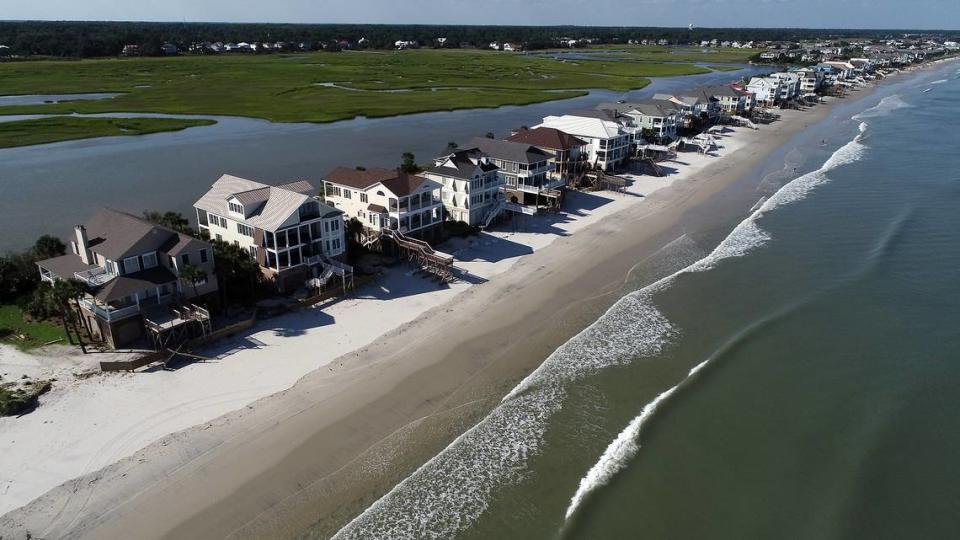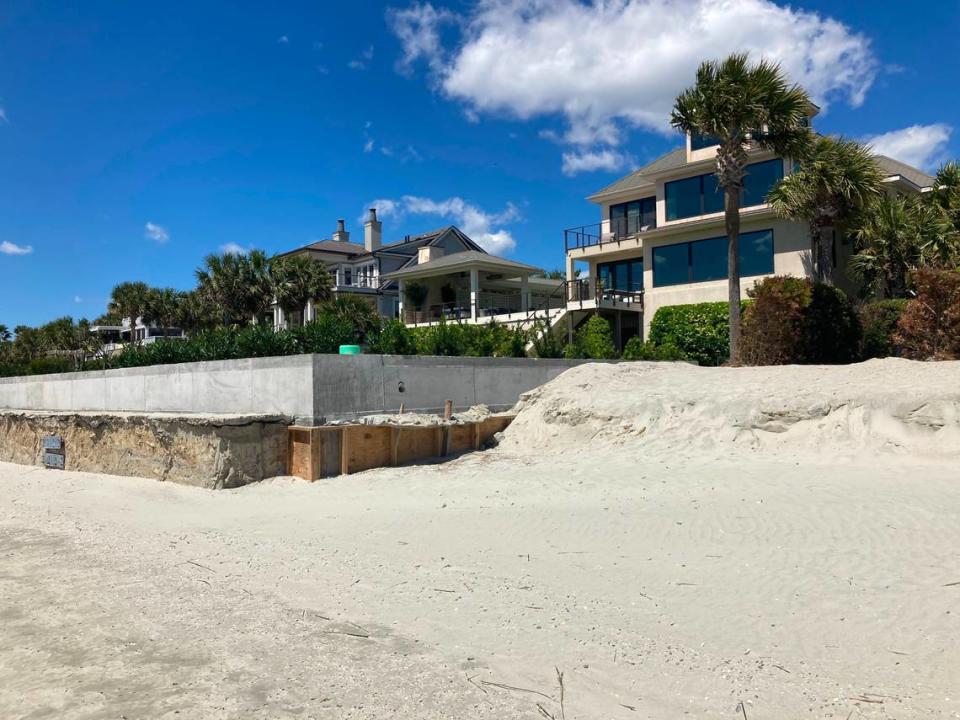Governor kills plan to allow seawalls, pay property owners accused of violating beach law
Gov. Henry McMaster vetoed Wednesday the Legislature’s plan for the state to compensate affluent oceanfront landowners accused of violating South Carolina’s beach management law, a 36-year-old statute meant to protect the seashore for the public.
At a news conference inside the State House, the governor said the effort to shield property owners from some parts of the coastal law was rushed and could curtail enforcement of the law, while exposing South Carolina to significant financial and legal liability.
Two budget provisos, passed late in the Legislative session without public hearings, would have made it easier for property owners to stop state decisions that are intended to protect the public beach.
The provisos could have affected hundreds of millions of dollars in seaside property, potentially allowing for construction of seawalls now banned by state law, while having taxpayers compensate property owners who win legal challenges against the state.
The provisos could also have allowed those who built illegal seawalls to keep them and sparked a flurry of legal challenges to the state’s beach law, critics have said.
“A piecemeal attempt to address beach erosion and management through provisos, which are only in effect for one fiscal year, is not good policy,’’ the Republican governor said in his veto message.
McMaster said the one-year provisos, which would need to be renewed in 2025, could expose the state not only to financial risk, but potential legal liability.
The provisos are “seemingly intended to undo previous enforcement efforts, stall pending actions and chill the Department of Environmental Services from initiating future ones,’’ his veto message said, noting that the measures would lead to “inconsistent application and enforcement of critical laws and regulations designed to protect and preserve our state’s pristine coastline.’’

McMaster’s decision Wednesday isn’t his first regarding seawall construction. In 2019, he vetoed legislation that would have allowed reconstruction of a battered seawall at Debordieu, an exclusive beach community in Georgetown County where a row of homes juts far onto the beach. At the time, McMaster said the legislation needed more scrutiny by the Legislature.
Some property owners were mad at the time and McMaster’s action this year is sure to anger others. The governor told reporters he understands the concerns of oceanfront property owners who are seeking help to defend their investments. Long term, the state needs to balance their needs with the needs of protecting the public beach, he said.
“It’s pitiful to see what erosion has done’’ to private property on parts of the coast, he said in remarks to the media. “On the other hand, you can’t stop the ocean from being the ocean.’’
South Carolina’s struggle with coastal management is occurring as the state faces increasing threats from rising sea levels and more intense storms, both of which are threatening to wash away oceanfront homes on many parts of the coast, including beaches near Charleston and south of Myrtle Beach.
As a result, property owners have been scrambling to find ways to protect their homes with seawalls and huge walls of sandbags. The dispute became particularly heated in 2018, after the state reset oceanfront building restriction lines that keep development back from the beach. Many lines were more restrictive, making it more difficult to fortify oceanfront property. That prompted the Legislature to step in and allow for less restrictions on how close a property could build a seawall or other structure to the beach. The state is now in the process of resetting the lines again, which could set up another battle.
New seawalls are illegal under the state’s 1988 beach management law and state regulators have cited scores of property owners for erecting seawalls, bulkheads and other measures to fend off the waves.
In the past year, one particularly high profile case has erupted near Charleston. An Isle of Palms property owner is in a bitter dispute with the state Office of Ocean and Coastal Resource Management over a seawall built along the beach at his Charleston County home. The state says it should not have been built.
While seawalls and hard sand bag walls offer some protection for private property, they can block public access on the beach and also worsen beach erosion as waves pound the walls. When beaches erode, it can hurt tourism that provides a hefty boost to South Carolina’s multibillion dollar tourist economy.

Leslie Lenhardt, a lawyer with the non-profit S.C. Environmental Law Project, said McMaster made the right decision.
“This really would have been a blow, a blow to our tourism industry,’’ she said, noting that an explosion of seawalls means South Carolina “would end up with just no beach.’’
Emily Cedzo, who has tracked the proviso effort in Columbia on behalf of the Coastal Conservation League, expressed relief at McMaster’s decision.
“We are very grateful for Gov. McMaster’s vetoes on the harmful beach provisos,’’ she said in an email. “He has been a constant leader in protecting our state’s beaches for the benefit of all who rely upon them. These vetoes make clear that our state agencies should be entrusted to implement longstanding, thoughtful policy and that new seawalls have no place on South Carolina’s beaches.’’
McMaster’s decision to kill the beach provisos was among 21 vetoes he issued in the state budget for the fiscal year that started Monday.
The beach provisos , pushed by Sen. Stephen Goldfinch, came out of the Senate and were approved by a budget negotiating committee last month. The committee did not say why it was approving the beach provisos, but voted 5-1 to include them in the state budget. Only Rep. Leon Stavrinakis, D-Charleston, voted against it, saying the plan needed more scrutiny.
One of the provisos allows property owners to more easily challenge state determinations of where the beach starts. Property owners would be able to immediately appeal such determinations by state regulators to the Administrative Law Court, a provision not now spelled out in state law.
Then, if property owners successfully challenged where jurisdiction over the beach begins, they could build or keep seawalls, while also recouping their attorneys fees and other costs of making the challenge.

The other proviso required the state coastal agency to reassess enforcement cases against oceanfront property owners made in the past six years.
If it is determined that property owners involved in enforcement cases would later not be in violation under less restrictive new jurisdictional limits, taxpayers must pay the legal fees the owners incurred fighting the state. It also could allow the property owners to keep seawalls or sand bags they had already installed.
That could cost taxpayers $2 million if the state lost the 100 or so cases it has made over seawall issues since 2018. But it could be more.
Some lawyers say the provisos could have encouraged more legal cases challenging limits on coastal development because property owners would know they could potentially get their money back.
Both provisos were proposed by Goldfinch, a Murrells Inlet Republican, who has backed oceanfront landowners who are battling the S.C. Office of Ocean and Coastal Resource Management over the use of seawalls and sandbags. Goldfinch has worked for some landowners as a private attorney, and while as a senator, also pushed changes in state rules that could help seaside property owners.
Sen. Sean Bennett, a Summerville Republican, said he deferred to Goldfinch on the provisos as a matter of courtesy to the concerns Goldfinch raised, but now probably would not support them.
Bennett served on the budget conference committee that approved the Goldfinch-backed provisos. Other conference committee members included Senate Finance Committee Chairman Harvey Peeler, R-Cherokee, and House Ways and Means Committee Chairman Bruce Bannister, R-Greenville.
“I understand what people are going through, but we’ve got rules in place,’’ Bennett said. “I would prefer to handle those rules within the system itself. If I had to do it over again, I likely would not have supported it.’’
A recording on Goldfinch’ cell phone said he is out of the country with limited availability.
Erosion hot spots where property owners could have benefited from the provisos include the Isle of Palms, the Debordieu resort near Georgetown, Harbor Island outside Beaufort, Garden City south of Myrtle Beach and the southern tip of Litchfield Beach, a thin strip of sand near Pawleys Island where houses were developed in the 1990s after Hurricane Hugo blasted the property.
South Carolina’s battles over seaside development are not new, dating almost to the inception of a 1988 law that was intended to address beach erosion by slowly moving new development away from the immediate seashore. The law banned new seawalls.
But with climate change raising sea levels and helping to intensify coastal storms, those battles are intensifying and legislators are listening to affluent landowners about helping them gain relief.
This story has been updated with additional remarks from Gov. McMaster and comments from Sen. Sean Bennett.

